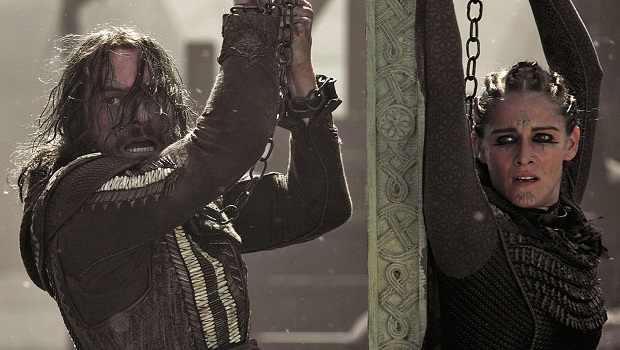Film Review – Assassin’s Creed
3 min read
Michael Fassbender and Marion Cotillard reunite with their Macbeth director Justin Kurzel for this adaptation of the popular Ubisoft video-game series Assassin’s Creed. Fassbender (who also produces) plays Callum Lynch, an original character created for the film. We are first introduced to Callum in 1986 when he returns home from an afternoon of bike riding to find the bleeding, elegantly posed corpse of his brutally murdered mother (Essie Davies). The narrative then flashes forward thirty years to reveal that the sweet, traumatized kid from the previous scene grew up to be a murderer himself (of a pimp though so it’s okay, or so the film repeatedly suggests) and is on death row awaiting execution.
Fassbender’s phenomenal talent largely goes to waste in Assassin’s Creed but we do get a small glimpse of what makes him arguably the best young actor of his generation in the film’s genuinely affecting lethal injection sequence. There’s real, primal terror in Callum’s eyes before he closes them for what he believes will be the last time. Thankfully (for Callum at least, perhaps less so for the audience) he’s soon opening them again in the fortress-like, Madrid based headquarters of the Abstergo Foundation.
Marion Cotillard plays Dr. Sophia Rikkin, the foundation’s leading scientist. The French Oscar winner gets even less opportunity than Fassbender to demonstrate what makes her one of the best young actresses of her generation, but at least she has plenty of overqualified company. Jeremy Irons, Charlotte Rampling, Michael K. Williams and Brendan Gleeson all turn up in supporting roles to gravely deliver grandiose sounding speeches that are equal parts clumsy exposition, groan worthy clichés and utter nonsense.
Sophia explains that her father and Abstergo’s CEO Alan Rikkin (Irons) hopes to bring about sustained global peace by eradicating violent and anti-social behaviour in human beings. In order to achieve this goal the foundation needs to learn the location of the Apple of Eden, an ancient, mystical MacGuffin containing the genetic code for free will (or some such silliness) that was hidden during the Spanish Inquisition by the Assassin Brotherhood. It turns out that Callum is descended from Aguilar de Nerha, one of the Brotherhood’s members. Sophia uses a device called the Animus to force Callum to access Aguilar’s memories concerning the Apple and its whereabouts.
Assassin’s Creed becomes a very different and infinitely more engaging movie the moment Callum reawakens as Aguilar in Spain circa 1492. Aguilar has a cool costume, hidden wrist blades, facial tattoos and, most importantly, actual agency. Instead of being perpetually incarcerated and strapped in a supine position Aguilar engages in daring rescues, escapes and infiltrations, and does so in pursuit of something he desires rather than because he is being forced or manipulated. Creative choreography, dazzling stunt work (with special credit going to Fassbender’s stunt double Damien Walters) and Adam Arkapaw’s dynamic cinematography all make the 15th century chase and hand-to-hand combat sequences riveting to watch. It’s pure schlock of course, but it’s fun and that’s all a movie like this really needs to be.
There’s also some nice, largely non-verbal chemistry between Fassbender and Ariane Labed, who plays Aguilar’s fiercely dedicated fellow assassin Maria. If Assassin’s Creed spent more time with these two in the past and less in the relatively tedious present it would have been a better, more enjoyable film. At least Kurzel and his collaborators have the comfort of knowing that their adaptation was faithful in that it captured one of the most frustrating aspects of playing the games themselves.

